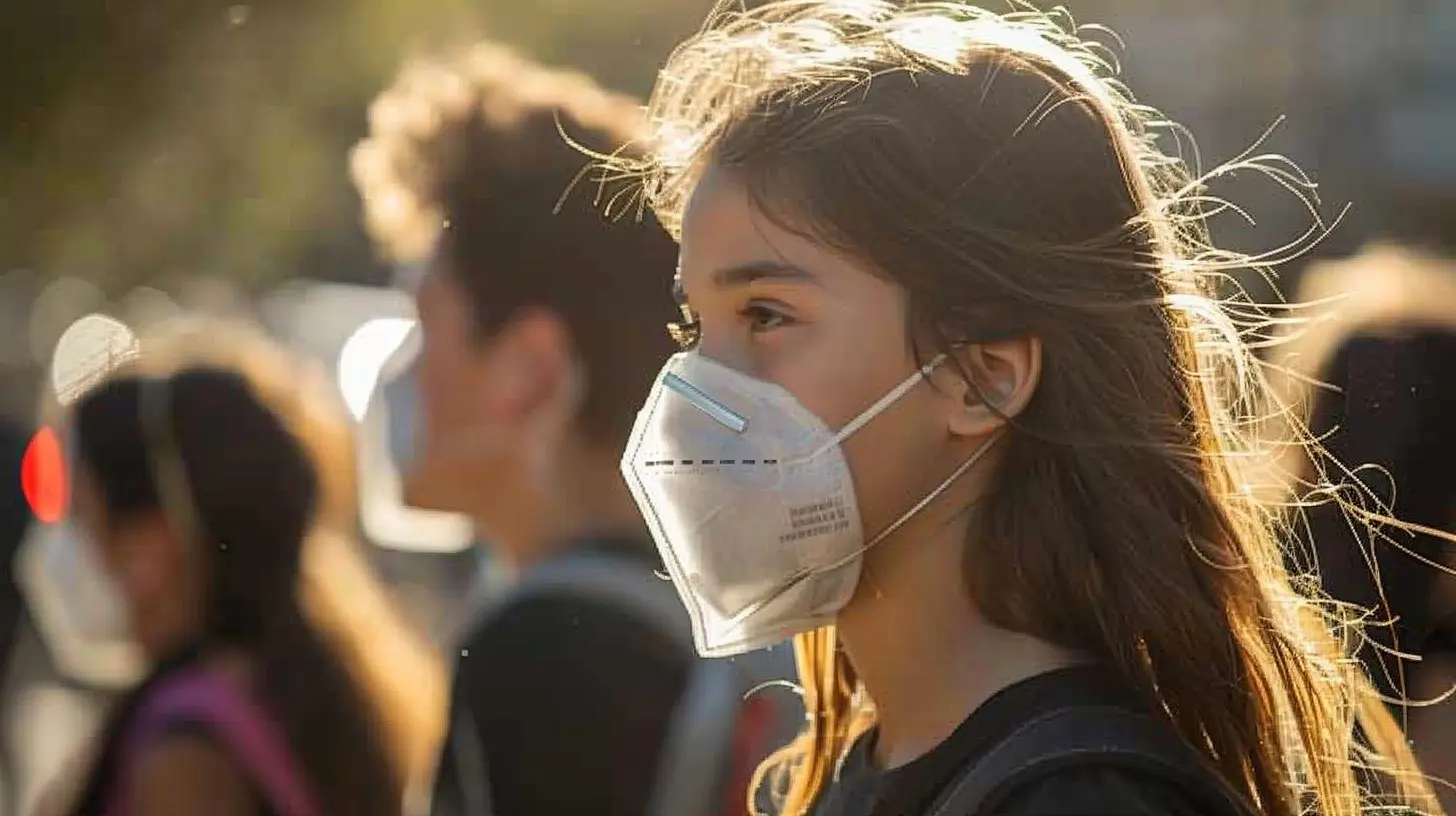21 February 2025
Have you ever taken a deep breath on a crisp, breezy morning and felt instantly revived? Now, imagine how that breath would feel in a smoggy, polluted city. Not so refreshing, right? Air quality plays a big role in how healthy we feel. But did you know it can also increase (or decrease) your chances of catching respiratory infections? Yup, the air you breathe every single day can either protect or harm your lungs, depending on what’s floating around in it. Let’s break it all down.

What Exactly Is Air Quality?
Before diving into how bad air can mess with your health, let’s first understand what air quality is. Air quality refers to how clean (or dirty) the air around us is. It’s typically measured by the amount of pollutants, like smoke, dust, chemicals, or gases, in the air. High air quality = clean, breathable air. Low air quality = stuff you probably don’t want in your lungs. Simple, right?The thing is, we often take air quality for granted because, well, we can’t always see the pollutants. But just because it’s out of sight doesn’t mean it’s out of harm's way. The air you breathe has a direct pathway to your lungs—and if it’s filled with harmful particles, your respiratory system could be in trouble.
The Connection Between Air Quality and Respiratory Infections
Let’s cut to the chase: poor air quality can increase your risk of respiratory infections. Why, you ask? Because pollutants in the air damage your respiratory system, making it easier for viruses, bacteria, and other nasty pathogens to invade. It’s like leaving the front door wide open for intruders. Not ideal.Here are a few key ways bad air quality affects your lungs and immune system:
1. Irritation of Airways
When you breathe in polluted air, tiny particles—like fine dust or chemicals—can settle in your airways. These particles irritate the lining of your respiratory tract, causing inflammation and swelling. Have you ever felt a burning sensation in your throat or struggled with a persistent cough after being outside on a smoggy day? That’s your body reacting to air pollutants.Inflamed airways are weaker and less equipped to fight off germs. This means that when cold or flu viruses come knocking, your body has a harder time keeping them out.
2. Weakened Immune Defenses
Your lungs have their own little defense team: tiny hairs called cilia. Think of them as the air filter in your car, trapping dirt and debris to prevent them from getting deeper into your system. But when the air is filled with pollutants, these cilia get overwhelmed or even damaged. Without these protective "gatekeepers," harmful pathogens like bacteria and viruses can sneak in and cause respiratory infections.To make matters worse, long-term exposure to airborne pollutants may also weaken your immune system overall. When your immune defenses are down, it’s like giving a free pass to infections like pneumonia, bronchitis, or even the flu.
3. Oxidative Stress
Stay with me here—this one sounds a bit technical but is super important. Polluted air often contains harmful molecules called free radicals. When you breathe them in, these free radicals can cause "oxidative stress," essentially damaging your cells and tissues. Think of it as rusting from the inside out. This damage weakens your lungs and leaves you more vulnerable to infections.
Who’s Most at Risk?
Now, you may be wondering: does poor air quality affect everyone equally? Well, no. While bad air isn’t great for anyone’s health, certain groups of people are hit harder than others. Here’s who needs to be especially careful:- Children: Kids’ lungs are still developing, making them more sensitive to pollutants.
- Elderly Adults: Aging naturally weakens the immune system, so seniors are more prone to infections.
- People with Pre-existing Conditions: If you have asthma, COPD, or other respiratory conditions, polluted air can worsen your symptoms and make infections more likely.
- Those Living in Polluted Areas: Urban dwellers and folks living near factories or highways face higher exposure to pollutants.
If you fall into any of these categories (or know someone who does), it’s worth taking extra steps to protect yourself from poor air quality.
Common Air Pollutants That Harm Your Lungs
Not all pollutants are created equal. Some are more notorious than others for causing respiratory issues. Here’s a quick roundup of the usual suspects:1. Particulate Matter (PM2.5 and PM10)
These are tiny particles of dust, dirt, soot, or smoke that are small enough to get lodged deep in your lungs. PM2.5, in particular, is so fine it can even enter your bloodstream. Scary, huh?2. Carbon Monoxide (CO)
This odorless, colorless gas is produced by burning fossil fuels. High levels of CO can reduce oxygen in your body, which is bad news for your lungs and immune system.3. Ozone (O3)
You’ve heard about the ozone layer up in the sky, protecting us from UV rays. But ground-level ozone (created by pollutants reacting in sunlight) is harmful and can irritate your respiratory system.4. Nitrogen Dioxide (NO2)
Commonly released from car exhaust and industrial processes, NO2 can inflame your lungs and make you more susceptible to infections.5. Sulfur Dioxide (SO2)
Produced by burning coal or oil, SO2 irritates your airways and can trigger asthma attacks.How to Protect Yourself from Poor Air Quality
The good news? You’re not powerless. There are simple ways to shield yourself from bad air and keep your lungs happy:1. Check Air Quality Reports
Before heading outside, check the air quality index (AQI) in your area. Apps like AirVisual or local weather websites can give you real-time updates. If the AQI is in the unhealthy range, try to stay indoors.2. Wear a Mask
During high pollution days, wearing a mask (like an N95) can filter out harmful particles and protect your lungs.3. Use Air Purifiers
Invest in a good-quality air purifier for your home. It can help reduce indoor air pollutants, especially if you live in an area with poor outdoor air quality.4. Keep Your Home Ventilated
While you want to block out outdoor pollution, don’t forget about indoor air quality. Open windows during low-pollution hours, avoid smoking indoors, and limit the use of harsh chemicals or aerosols.5. Stay Hydrated
Drinking water keeps your airways moist and helps your body flush out toxins.6. Plant Some Greenery
Plants like snake plants, spider plants, and peace lilies are natural air purifiers. Plus, they’re great decor!Can Improving Air Quality Help Fight Respiratory Infections?
Absolutely! Studies show that improving air quality can significantly reduce cases of respiratory infections. Cleaner air means less irritation, lower inflammation, and stronger immune defenses. Governments and communities can also make a difference by enforcing stricter air pollution laws, investing in cleaner energy, and planting more trees.But it’s not just up to policymakers—each of us can play a part. By opting for public transport, reducing energy use, and cutting down on waste, we can collectively improve the air we all breathe.







Yvonne Pacheco
This article clearly highlights the crucial link between air quality and respiratory health. It's alarming how pollution can compromise our immune systems, making us more vulnerable to infections. We must prioritize clean air initiatives to protect our health and well-being. Great read!
April 5, 2025 at 2:57 PM